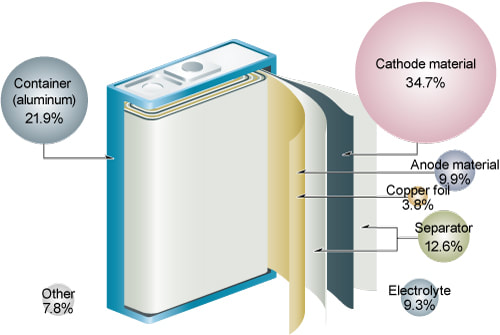
Lithium Ion batteries are rechargeable batteries. When discharging, the electrons present in the Lithium Ion battery, move from the negative node (Cathode) to the positive node (Anode). The process is reversed when recharging the battery. That is, the electrons, while recharging the battery, move from the positive node to the negative node. Intercalated lithium is used in Li-ion batteries as its electrode material as opposed to the metallic lithium traditionally used in lithium ion batteries that are non- rechargeable.
The recent years have seen a stellar increase in the demand for these batteries, mostly because of the search for a renewable source of energy. Lithium Ion Batteries are not only renewable but clean too. The battery produces no kind of pollution, be it in the production process or be it during its usage.
Industrial Minerals published a recent report that concludes that a rise in the demand of EVs has in turn given rise to a never before seen demand for lithium. In the Chinese market lithium carbonate prices that are used in lithium ion batteries have increased to record highs.
Effect on Lithium Ion Battery Material Suppliers
As the figures published by several researchers suggest, the demand for Lithium Ion batteries are at a record high. Even the price is at an all-time high as the huge demand for Lithium Ion batteries exceeds the supply of the Lithium Ion batteries by leaps and bounds.
The Lithium Ion Battery Material Suppliers have not been deprived of the emerging riches of the Lithium Ion Battery industry. As the companies aim at increasing the production, the demand for raw materials has increased too. The material suppliers of Lithium Ion batteries too, have the prices of materials hiked because of increased demands. The innovation and search for a cleaner alternative to Petroleum has served the battery material suppliers well.
